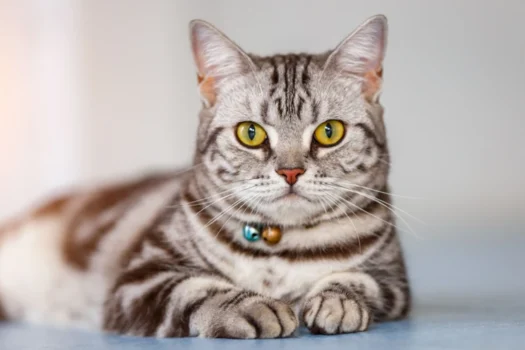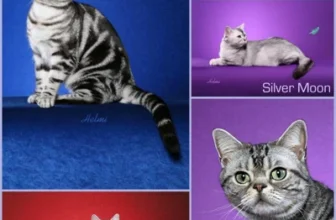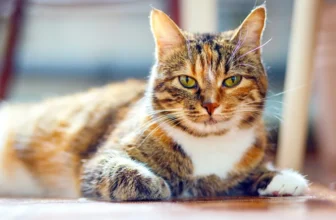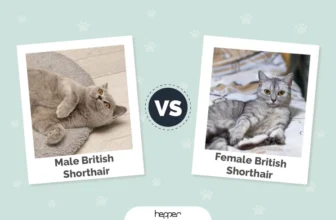As a cat owner, there is nothing more frustrating than your American Shorthair constantly meowing, especially at inappropriate times. Whether it’s in the middle of the night or when you’re trying to focus on work, excessive meowing can quickly become a headache. You may find yourself wondering, “Why is my cat meowing so much and how can I stop it?” Well, don’t worry, because in this article we will discuss the possible reasons behind this behavior and provide effective training techniques to train your American Shorthair to stop excessive meowing. Let’s dive in!
Why is My American Shorthair Meowing Excessively?
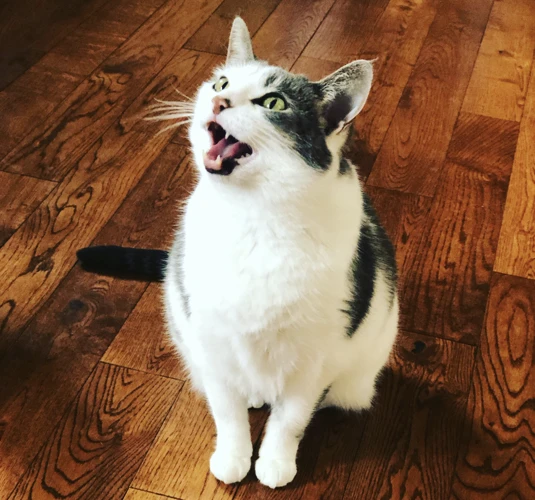
It’s common for American Shorthairs to meow from time to time, but excessive meowing can be frustrating and concerning for pet owners. If you’re tired of constantly hearing your cat’s cries, it’s important to understand the reasons behind this behavior. Excessive meowing can be caused by both health and behavioral issues that require attention. In this section, we’ll explore the possible reasons why your American Shorthair may be meowing excessively and what you can do about it.
Health Issues
When a cat is meowing excessively, one potential reason may be due to underlying health issues. If you notice your American Shorthair meowing more than usual, it may be a good idea to take them to the veterinarian to rule out any health problems. Some of the health issues that can cause excessive meowing include:
- Hyperthyroidism: This is a common condition in older cats that can cause them to meow loudly and frequently. Other symptoms of hyperthyroidism can include weight loss and increased appetite. Medication or surgery can help manage this condition.
- Pain or discomfort: Cats who are experiencing pain or discomfort may meow excessively to let their owners know that something is wrong. This may be due to a variety of issues such as dental problems, arthritis, or digestive issues.
- Hearing Loss: As cats age, they may experience a decline in their hearing abilities. If your cat can no longer hear themselves meow, they may start to meow more loudly and excessively. This is often accompanied by a change in their behavior as well.
- Cognitive dysfunction: Just like humans, cats can experience cognitive decline as they age. This can result in changes in their behavior, including excessive meowing. It is important to work with your veterinarian to manage cognitive dysfunction in cats.
If your cat is meowing excessively, it is important to rule out any underlying health issues before trying any training techniques or behavioral modifications. If you do suspect that your cat is meowing due to a health issue, it is best to consult with your veterinarian for proper diagnosis and treatment.
Behavioral Issues
| Attention Seeking: | American Shorthairs are known to meow excessively when they want attention. This could be because they want to play, be petted, or simply be near you. If they feel ignored, they may resort to meowing in order to get your attention. |
| Stress: | Just like humans, cats can experience stress too. Major changes in their environment, such as moving to a new home or the introduction of a new pet, can lead to stress and anxiety. Excessive meowing may be a way for your American Shorthair to express their discomfort and need for reassurance. |
| Boredom: | Cats need physical and mental stimulation to stay healthy and happy. If they don’t have enough toys or activities to occupy themselves, they may become bored and meow excessively out of frustration. |
Some American Shorthairs may also meow excessively due to separation anxiety or territorial behavior. If you suspect that your cat’s meowing is due to one of these issues, it’s important to consult with a veterinarian or animal behaviorist for additional guidance. In the meantime, trying out some of the training techniques we’ll discuss in the next section may help alleviate the problem.
For example, providing mental stimulation with interactive toys or games can help distract your cat from any stress or boredom they may be feeling. You can also address any territorial behavior by following tips to discourage marking indoors, which can help reduce your cat’s anxiety and limit excessive meowing in response to territorial threats.
Training Techniques to Stop Excessive Meowing
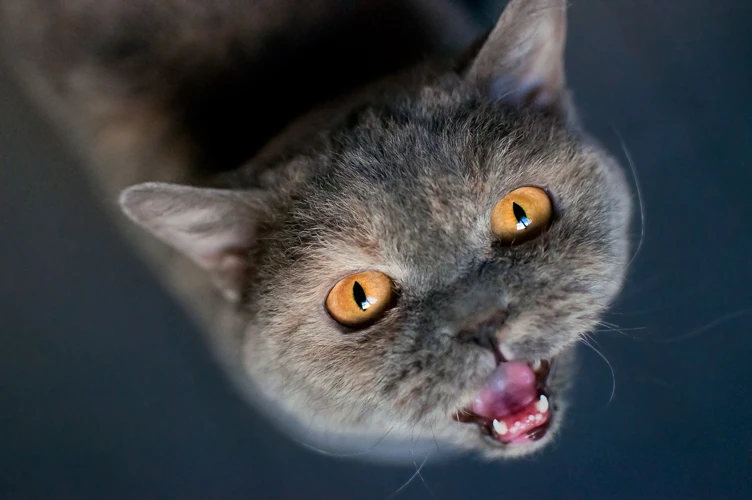
If you’re a cat owner dealing with an American Shorthair that won’t stop meowing, you may be wondering how to train them to be quieter. Fortunately, there are several effective techniques you can use to stop excessive meowing. In this section, we will explore some of these techniques, including positive reinforcement training, providing mental stimulation, and addressing health issues. By implementing these training methods, you’ll be on your way to a quieter household and a happier pet.
Positive Reinforcement Training
When it comes to training your American Shorthair to stop excessive meowing, positive reinforcement training can be a powerful tool. This technique involves providing your cat with a reward each time they exhibit the desired behavior. In this case, you can reward your cat for remaining calm and quiet instead of meowing excessively. Here are some tips to use positive reinforcement training effectively:
- Start small: Begin by rewarding your cat for short periods of quiet behavior, and gradually increase the duration.
- Use a clicker or vocal cue: This will help your cat associate the reward with the behavior you are trying to reinforce.
- Be consistent: Make sure that you reward your cat every time they exhibit the quiet behavior, even if it’s just for a few seconds.
- Use high-value treats: Choose treats that your cat really enjoys, such as small pieces of cooked chicken or tuna.
- Combine with other techniques: Positive reinforcement training can be even more effective when used in combination with other techniques, such as providing mental stimulation or addressing health issues.
Remember, positive reinforcement training is all about teaching your cat what behavior you want them to exhibit, rather than punishing them for bad behavior. By using rewards to encourage quiet behavior, you can help your American Shorthair learn to meow less frequently.
Note: For more information on addressing behavioral issues in American Shorthairs, check out our article on discouraging indoor marking.
Ignoring the Meowing
Ignoring the Meowing: Ignoring your American Shorthair’s excessive meowing can be an effective way to train them to stop. When you give your cat attention every time they meow, it reinforces the behavior. On the other hand, if you ignore the behavior and don’t give in, your cat will learn that meowing does not get them what they want. It is important to note, however, that this technique should only be used when you are sure your cat is not meowing because of a health issue or emergency.
One thing to keep in mind is that this technique can be difficult, especially if your cat is prone to loud and persistent meowing. It’s important to stay strong and not give in, as consistency is key when training your cat out of bad habits. This technique can be combined with positive reinforcement training, such as giving your cat a treat when they stop meowing, to help reinforce good behavior.
If your cat is meowing excessively because they are hungry or want attention, it is important to stick to a regular feeding and playtime schedule. This helps your cat feel secure and know when to expect food and attention, reducing the likelihood of excessive meowing. For more tips on training your American Shorthair, check out our articles on playtime training and scratching behavior.
Providing Mental Stimulation
Cats, like their wild counterparts, need mental stimulation to keep them happy and healthy. Providing mental stimulation is an excellent way to reduce excessive meowing behavior in American Shorthairs. Cats are intelligent creatures that get bored easily; therefore, it’s essential to offer them various stimuli to alleviate their boredom. Some ways to provide mental stimulation include:
| Techniques | How-to |
|---|---|
| Puzzle Feeders | Get your American Shorthair a puzzle feeder for a fun and stimulating mealtime. Puzzle feeders are toys that dispense food. The cat needs to work out how to get the food out, providing mental stimulation and an excellent mental workout all in one. |
| Interactive Toys | Interactive toy options include toys with attachments, such as feathers and balls. Playing with interactive toys is an excellent way to bond with your American Shorthair and help them alleviate boredom, reducing the need for excessive meowing. |
| Window Views | Make sure your American Shorthair has a good view of the outside world. Window perches and high shelving are excellent for providing a vantage point and visual stimulation, keeping your feline friend entertained and reducing their need to meow excessively. |
| Cat Trees | Cat trees are an excellent way to provide exercise and mental stimulation for your American Shorthair. They can climb, play, and nap on a cat tree. This helps them burn off excess energy, make them happier and less likely to meow excessively. |
By providing plenty of mental stimulation to your American Shorthair throughout the day, you will help them keep their minds sharp and reduce the likelihood of excessive meowing. Along with other training techniques, this can lead to a more harmonious relationship with your feline friend. If you also want tips on how to stop your American Shorthair from Begging for Food, read our article.
Addressing Health Issues
Keeping your American Shorthair healthy is an essential part of training to stop excessive meowing. Meowing could be a symptom of an underlying health issue. Therefore it is vital to take your cat to the vet for a checkup. Here are some potential health issues that might be causing your cat to meow excessively:
- Hyperthyroidism: Hyperthyroidism is a common condition that occurs in older cats. A cat suffering from this condition may display symptoms such as weight loss, increased appetite, and excessive meowing. It is important to get a proper diagnosis and treatment from a veterinarian.
- Urinary Tract Infections: Urinary tract infections can cause pain and discomfort for your cat and lead to excessive meowing. If you notice your cat urinating more frequently than usual or showing signs of discomfort while urinating, take it to the vet right away.
- Dental Problems: Dental problems can cause pain and discomfort when your cat eats or meows. A cat with dental problems may also show signs of drooling, bad breath, and swollen gums. If you suspect dental problems, consult with a veterinarian on how to address this issue.
- Stress: Stress can cause your American Shorthair to meow excessively. This could be triggered by factors such as environmental changes, lack of social interaction with other cats or humans, or an unhealthy diet. Ensure that you provide your cat with a comfortable and secure environment and give it attention and affection.
By addressing any potential health issues, you can help reduce your cat’s excessive meowing. If you suspect that your American Shorthair has any of the above health issues or any other illness, seek medical attention immediately to ensure that your cat is healthy and happy.
Note: If you want to know more about how to train your American Shorthair to stop excessive meowing, read our other articles American Shorthair Jumping Habit and Eliminating Am Shorthair Night Crazies.
Tips to Help With Training
When it comes to training your American Shorthair to stop excessive meowing, consistency is key. However, there are several tips and tricks that can help make the training process easier and more effective. By implementing these tips, you can ensure that your cat is comfortable, motivated, and on-track to reducing their meowing. In this section, we’ll explore some of the most effective techniques for assisting your cat in learning to communicate in a more appropriate manner.
Be Consistent
One of the most critical aspects of training your American Shorthair to stop excessive meowing is consistency. To achieve the best results possible, you must regularly reinforce good behavior and discourage negative behavior. This means that everyone in your household must adhere to the same rules and methods of training.
Using a consistent training schedule can help your cat learn faster. Create a schedule that includes regular time for feeding, playing, and training. Training your cat for a few minutes every day can be more effective than long, sporadic sessions.
To keep track of your progress and ensure consistency, create a table to document your training sessions. On one side of the table, write down the date, and on the other side, make notes about your cat’s behavior and progress. For example, if your American Shorthair meows excessively while you are eating dinner, record how long they meow and how you responded to the behavior.
Consistency is key when training your American Shorthair to stop excessive meowing. By sticking to a regular training schedule and documenting your progress, you can help your cat learn faster and more effectively.
Use Treats as Rewards
Rewarding your American Shorthair with treats is a proven way to reinforce good behavior and discourage excessive meowing. However, it’s important to use treats appropriately and in moderation. Here are some tips on how to use treats as rewards effectively:
| Tip | Description |
|---|---|
| 1 | Use High-Value Treats: Use treats that your cat really enjoys but only give small pieces. This will help prevent weight gain and make the treats more effective as rewards. |
| 2 | Time the Treats Correctly: Give your cat a treat immediately after she has exhibited good behavior. This will help her understand that her good behavior is what earns her the reward. |
| 3 | Don’t Overuse Treats: Don’t offer treats too frequently as this may encourage your cat to associate excessive meowing with treats. |
| 4 | Use Treats in Combination: Use treats in combination with other positive reinforcement techniques such as praise, petting or playtime to reinforce good behavior more consistently. |
Remember, using treats as rewards should only be one part of your overall training plan. Be sure to use a variety of techniques to train your American Shorthair as you work to stop his excessive meowing.
Make Sure Your Cat is Comfortable
Ensuring that your American Shorthair is comfortable is a crucial aspect of training them to stop excessive meowing. Here are some tips to make your cat feel comfortable:
- Provide a cozy sleeping space: Cats love to sleep, and a comfortable sleeping space is essential for their well-being. Make sure that your cat has a cozy bed or a comfortable pillow to sleep on.
- Keep their litter box clean: A dirty litter box can make your cat uncomfortable, and they may start meowing excessively as a result. Make sure to clean the litter box regularly to keep your cat comfortable and happy.
- Ensure proper nutrition: A healthy diet is essential for your cat’s overall well-being and comfort. Make sure to provide your cat with a balanced diet that meets their nutritional needs.
- Create a safe environment: Your cat needs to feel safe and secure in their surroundings. Provide them with a safe environment where they can play, relax and explore without fear or anxiety.
- Provide playtime: Your American Shorthair needs mental stimulation and playtime to keep them happy and comfortable. Make sure to provide them with plenty of toys and playtime to keep them entertained and happy.
By making sure that your cat is comfortable, you can help reduce excessive meowing and improve their overall quality of life. Keep in mind that every cat is different and may require different levels of comfort. Paying close attention to your cat’s behavior and body language can help you determine what makes them comfortable and how to provide the best care possible.
Consult a Veterinarian
If despite your best efforts, your American Shorthair is still meowing excessively, it’s important to consult a veterinarian. Excessive meowing can be a symptom of an underlying medical issue. A visit to the veterinarian can help rule out any health problems that may be causing your cat to meow excessively. Here are some reasons why it’s important to consult a veterinarian:
- Rule Out Health Issues: A veterinarian can examine your cat to rule out any medical conditions that may be causing the excessive meowing. Illnesses like hyperthyroidism, kidney disease, and tumors can all cause excessive vocalization in cats.
- Receive Professional Advice: A veterinarian can provide valuable advice to help you deal with excessive meowing. They can give you tips on what to do when your cat starts to meow excessively, as well as recommend other training techniques that you may not have considered.
- Get Medication if Necessary: In some cases, medication may be necessary to treat the underlying medical issue causing your American Shorthair to meow excessively. A veterinarian can prescribe medication and monitor its effectiveness, ensuring your cat is receiving the best treatment for their condition.
- Ensure Your Cat’s Health: Regular check-ups with a veterinarian can help ensure your American Shorthair is healthy. Catching potential health issues early can help prevent them from turning into more serious problems.
Remember, consulting a veterinarian is an important step in the training process. Your cat’s excessive meowing may be a sign of a more serious condition, so it’s essential to have your cat examined by a professional.
Conclusion
In conclusion, training your American Shorthair to stop excessive meowing can be a challenging but rewarding process. It’s important to first identify the root cause of the meowing, whether it’s a health or behavioral issue. Once you understand why your cat is meowing excessively, you can begin implementing training techniques such as positive reinforcement, ignoring the meowing, providing mental stimulation, and addressing any health issues.
Remember to be consistent with your training and use treats as rewards to reinforce positive behavior. It’s also important to make sure your cat is comfortable during the training process and to consult a veterinarian if you suspect any underlying health issues.
Training your American Shorthair to stop excessive meowing will require patience and persistence, but with dedication and the right techniques, you can have a much quieter and happier home. So don’t give up, stay positive, and enjoy the benefits of having a well-trained and contented cat.
Frequently Asked Questions
How long does it take to train an American Shorthair to stop excessive meowing?
It depends on the cause of the meowing and the training techniques used. Some cats may learn quickly while others may take longer. Consistency and patience are key.
What are some common health issues that can cause excessive meowing in American Shorthairs?
Hyperthyroidism, kidney disease, and dental pain are common health issues that can cause excessive meowing in American Shorthairs.
Can ignoring the meowing really help to stop the behavior?
Yes, ignoring the meowing can teach your cat that excessive meowing will not result in attention or rewards. However, it is important to make sure that your cat’s needs are being met and that any potential health issues are addressed.
What types of mental stimulation can be provided to help stop excessive meowing?
Puzzle toys, interactive feeders, and playtime with toys can all provide mental stimulation for your cat and help reduce excessive meowing.
Can providing treats as rewards encourage excessive meowing?
Providing treats as rewards for desired behaviors can be an effective part of positive reinforcement training. However, it is important to use treats in moderation and to make sure that they are not causing weight gain or other health issues.
Will consulting a veterinarian be necessary to stop excessive meowing?
If your cat’s excessive meowing is due to a health issue, consulting a veterinarian will be necessary to effectively stop the behavior. Additionally, a veterinarian can provide guidance on behavior modification techniques.
Is it possible to completely eliminate excessive meowing in American Shorthairs?
While it is possible to reduce and manage excessive meowing, complete elimination may not be possible in all cases. It is important to understand and address the underlying cause of the behavior, rather than simply trying to suppress it.
What if my American Shorthair’s excessive meowing is due to separation anxiety?
If your cat’s excessive meowing is due to separation anxiety, techniques such as desensitization and counterconditioning may be necessary to effectively reduce the behavior. Consulting a veterinarian or animal behaviorist can also be helpful in these cases.
Is punishment an effective way to stop excessive meowing?
No, punishment can lead to fear and anxiety in cats and can make the meowing behavior worse. Positive reinforcement training is a more effective and humane way to modify behavior.
Will my American Shorthair eventually stop excessive meowing on their own?
If the meowing behavior is due to a temporary issue, such as a change in routine or stress, your cat may eventually stop meowing excessively on their own. However, it is important to address the behavior if it becomes persistent or is due to an underlying health or behavioral issue.

